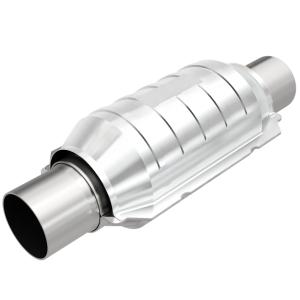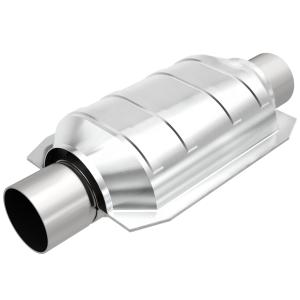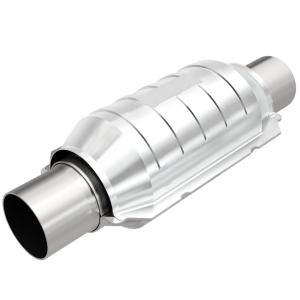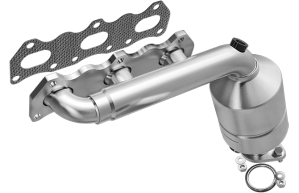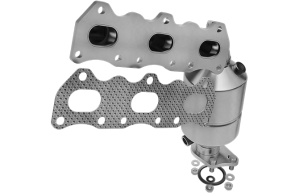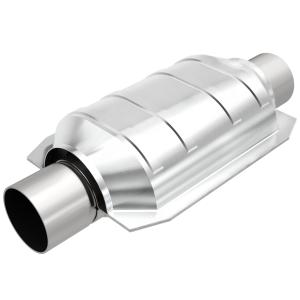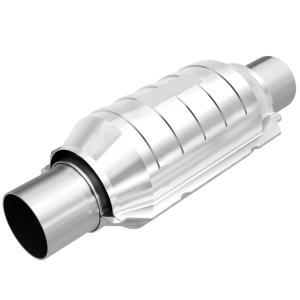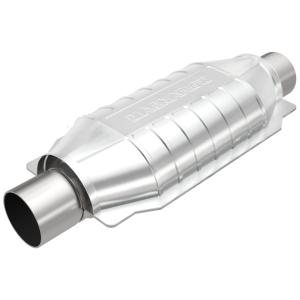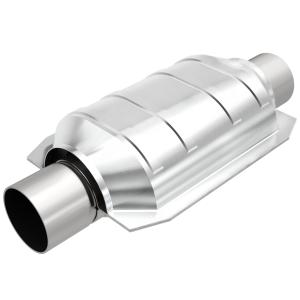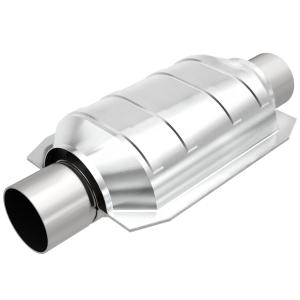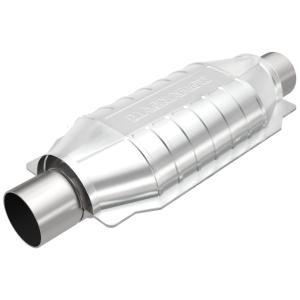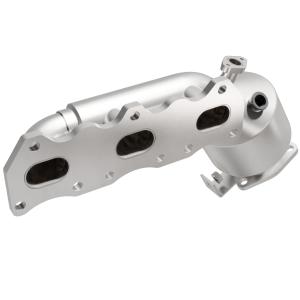Hello, Sign In!
Suzuki Vitara Catalytic Converters
At Andy's Auto Sport, we have a huge variety of Suzuki Vitara catalytic converters to ensure that you have every catalytic converter option available to you. We go out of our way to carry every major line of Suzuki Vitara catalytic converters, so that whether you are looking for replacement Suzuki Vitara catalytic converter or a performance high flow cat or anything in between, we've got it for you. Andy's Auto Sport is the ultimate shopping destination for your Suzuki Vitara catalytic converter needs!
Select Your Vehicle
Shop Suzuki Vitara Catalytic Converters by Brand
1 - 12 of 23
Sort by:

Fits: 2005 Suzuki Grand Vitara, 1999 Suzuki Grand Vitara, 2002 Suzuki Grand Vitara, 2000 Suzuki Grand Vitara, 2001 Suzuki Grand Vitara, 2003 Suzuki Grand Vi...
PART# 457204

Fits: 1999 Suzuki Esteem, 2001 Suzuki Vitara, 2002 Suzuki Aerio, 2000 Suzuki Esteem, 1998 Suzuki Esteem, 2003 Suzuki Vitara, 2003 Suzuki Aerio, 1999 Suzuki ...
PART# 441304

Fits: 2004 Toyota 4Runner; 4, 6V, 2010 Toyota Matrix; 2.4, 4L, 2003 Suzuki Grand Vitara; 2.5, 6V, 1999 Suzuki Grand Vitara; 2.5, 6V, 2009 Toyota Matrix; 2.4...
PART# 51204

Fits: 06-08 Suzuki Grand Vitara (V 6 2.7 LGAS), 04-06 Suzuki XL-7 (V 6 2.7 LGAS)
PART# 51254

Fits: 06-08 Suzuki Grand Vitara (V 6 2.7 LGAS), 04-06 Suzuki XL-7 (V 6 2.7 LGAS)
PART# 51272

Fits: 1999 Suzuki Esteem, 2001 Suzuki Vitara, 1996 Subaru SVX, 2002 Suzuki Aerio, 2000 Suzuki Esteem, 1998 Suzuki Esteem, 2003 Suzuki Vitara, 2000 Suzuki Vi...
PART# 444104

Fits: 2004 Toyota 4Runner; 4, 6V, 2003 Suzuki Grand Vitara; 2.5, 6V, 1999 Suzuki Grand Vitara; 2.5, 6V, 2006 Toyota Prius; 1.5, 4L, 2001 Suzuki Grand Vitara...
PART# 99204HM

Fits: 2001 Toyota Camry; 3, 6V, 1999 Toyota Sienna; 3, 6V, 2002 Toyota Solara; 3, 6V, 2001 Toyota Sequoia; 4.7, 8V, 2000 Toyota Avalon; 3, 6V, 2003 Suzuki V...
PART# 51005

Fits: 1999 Suzuki Esteem, 2001 Suzuki Vitara, 2002 Suzuki Aerio, 2000 Suzuki Esteem, 1998 Suzuki Esteem, 2003 Suzuki Vitara, 2003 Suzuki Aerio, 1999 Suzuki ...
PART# 441305

Fits: 1999 Suzuki Esteem, 2001 Suzuki Vitara, 1996 Subaru SVX, 2002 Suzuki Aerio, 2000 Suzuki Esteem, 1998 Suzuki Esteem, 2003 Suzuki Vitara, 2000 Suzuki Vi...
PART# 444105

Fits: 2001 Toyota Camry; 3, 6V, 2000 Toyota Tacoma; 2.7, 4L, 1990 Toyota Celica; 2, 4L, 1999 Toyota Solara; 3, 6V, 1998 Toyota Camry; 2.2, 4L, 2003 Suzuki V...
PART# 99005HM

Fits: 2003 Suzuki Grand Vitara; 2.5, 6V, 2004 Suzuki Vitara; 2.5, 6V, 2002 Suzuki Grand Vitara; 2.5, 6V, 1999 Suzuki Grand Vitara; 2.5, 6V, 2001 Suzuki Gran...
PART# 23282
When you click on links to various merchants on this site and make a purchase, this can result in this site earning a commission. Affiliate programs and affiliations include, but are not limited to, the eBay Partner Network.
Not able to find what you are looking for?


Catalytic Converter for Suzuki Grand Vitara 2006-2008 2.7L Rear

Manifold Catalytic Converter for Suzuki Grand Vitara 2.5L 99-05 Left + Right Set

Suzuki Grand Vitara 2.7L Manifold Catalytic Converter 2006-2008 Right Side

Suzuki Grand Vitara 2.5L Both Manifold Catalytic Converters 1999-2005

Suzuki Grand Vitara 2.7L Both Manifold Catalytic Converters 2006-2008

Suzuki Grand Vitara 2.4L Manifold Catalytic Converters 2009-2013
WHY TO BUY?
The good news is that, although replacement Suzuki Vitara catalytic converters can be costly from your local dealership, aftermarket units (many times made by the same original equipment manufacturers) are substantially less expensive and can be purchased as direct-fit bolt-on units (assuming that the original converter was also bolted on) or weld-on units. Replacing your Suzuki Vitara catalytic converter can restore power that has been lost due to a faulty original converter and will make your vehicle run better overall. In addition, a bad Suzuki Vitara catalytic converter means that your exhaust is releasing harmful toxins into the atmosphere and environment, so getting a new one means you’re doing your part to keep the earth and its atmosphere clean.
DID YOU KNOW?
Modern catalytic converters are much less restrictive than in days past, so much so that the antiquated (and illegal) method of "gutting" the converters of their internal structures has been deemed almost pointless on newer cars, as the performance gains are minimal, if any. Aftermarket high-flow Suzuki Vitara catalytic converters are therefore a much better (and more responsible) choice for those seeking to upgrade their exhaust systems or replace a faulty converter.
So how do you know if your Suzuki Vitara catalytic converter is on its way out? If your Suzuki Vitara engine seems to be losing power or your temperature gauge reads a little high, one possible culprit could be that a rich condition is feeding excessive unburned fuel into the catalytic converter, which can overheat it as well as damage it. It is common to see your Suzuki Vitara catalytic converter glowing orange/red when this condition is present. Another common sign of catalytic converter failure is the infamous "rotten egg" smell. Other common symptoms include: a lack of power, rough engine idle, or stalling. If you are replacing your Suzuki Vitara catalytic converter due to any of the above circumstances, it is a good idea to also replace your oxygen sensor, since it plays a vital role in the air/fuel mixture ratio and may have also been damaged due to the same adverse conditions. Finally, physical damage can sometimes occur if a large rock or other object hits Suzuki Vitara catalytic converter, resulting in a damaged ceramic core. This can often be heard, as smaller ceramic pieces will bounce around inside the converter housing. As you can imagine, this is often accompanied by a loss of power due to exhaust blockage.
So how do you know if your Suzuki Vitara catalytic converter is on its way out? If your Suzuki Vitara engine seems to be losing power or your temperature gauge reads a little high, one possible culprit could be that a rich condition is feeding excessive unburned fuel into the catalytic converter, which can overheat it as well as damage it. It is common to see your Suzuki Vitara catalytic converter glowing orange/red when this condition is present. Another common sign of catalytic converter failure is the infamous "rotten egg" smell. Other common symptoms include: a lack of power, rough engine idle, or stalling. If you are replacing your Suzuki Vitara catalytic converter due to any of the above circumstances, it is a good idea to also replace your oxygen sensor, since it plays a vital role in the air/fuel mixture ratio and may have also been damaged due to the same adverse conditions. Finally, physical damage can sometimes occur if a large rock or other object hits Suzuki Vitara catalytic converter, resulting in a damaged ceramic core. This can often be heard, as smaller ceramic pieces will bounce around inside the converter housing. As you can imagine, this is often accompanied by a loss of power due to exhaust blockage.
FAQs
Q: What is a hi-flow catalytic converter? Why buy one?
A: All stock catalytic converters are restrictive when it comes to exhaust flow, and they essentially place a choke hold on performance. The hi-flow catalytic converters on the market today have a higher flow capacity than factory units. Still able to pass emissions and gain horsepower, how can you go wrong with a hi-flow catalytic converter?
Q: How do you install a hi-flow catalytic converter?
A: There are two kinds of catalytic converters. The first are direct fit converters (no welding required) which have all necessary flanges and oxygen sensors just like the original equipment catalytic converters. There are also universal fit catalytic converters that are designed to be welded or clamped in place. Universal fit converters have the same flow characteristics as direct fit models with the same inlet and outlet diameter.
A: All stock catalytic converters are restrictive when it comes to exhaust flow, and they essentially place a choke hold on performance. The hi-flow catalytic converters on the market today have a higher flow capacity than factory units. Still able to pass emissions and gain horsepower, how can you go wrong with a hi-flow catalytic converter?
Q: How do you install a hi-flow catalytic converter?
A: There are two kinds of catalytic converters. The first are direct fit converters (no welding required) which have all necessary flanges and oxygen sensors just like the original equipment catalytic converters. There are also universal fit catalytic converters that are designed to be welded or clamped in place. Universal fit converters have the same flow characteristics as direct fit models with the same inlet and outlet diameter.
Filter Your Results
Category 

-
Catalytic Converters(23)
Brand 

-
 MagnaFlow(23)
MagnaFlow(23)
Suzuki Vitara Catalytic Converters
At Andy's Auto Sport, we have a huge variety of Suzuki Vitara catalytic converters to ensure that you have every catalytic converter option available to you. We go out of our way to carry every major line of Suzuki Vitara catalytic converters, so that whether you are looking for replacement Suzuki Vitara catalytic converter or a performance high flow cat or anything in between, we've got it for you. Andy's Auto Sport is the ultimate shopping destination for your Suzuki Vitara catalytic converter needs!
Choose Your Vehicle:
Shop Suzuki Vitara Catalytic Converters by Brand
1 - 12 of 23
Sort by:

Fits: 2005 Suzuki Grand Vitara, 1999 Suzuki Grand Vitara, 2002 Suzuki Grand Vitara, 2000 Suzuki Grand Vitara, 2001 Suzuki Grand Vitara, 2003 Suzuki Grand Vi...
PART# 457204

Fits: 1999 Suzuki Esteem, 2001 Suzuki Vitara, 2002 Suzuki Aerio, 2000 Suzuki Esteem, 1998 Suzuki Esteem, 2003 Suzuki Vitara, 2003 Suzuki Aerio, 1999 Suzuki ...
PART# 441304

Fits: 2004 Toyota 4Runner; 4, 6V, 2010 Toyota Matrix; 2.4, 4L, 2003 Suzuki Grand Vitara; 2.5, 6V, 1999 Suzuki Grand Vitara; 2.5, 6V, 2009 Toyota Matrix; 2.4...
PART# 51204

Fits: 06-08 Suzuki Grand Vitara (V 6 2.7 LGAS), 04-06 Suzuki XL-7 (V 6 2.7 LGAS)
PART# 51254

Fits: 06-08 Suzuki Grand Vitara (V 6 2.7 LGAS), 04-06 Suzuki XL-7 (V 6 2.7 LGAS)
PART# 51272

Fits: 1999 Suzuki Esteem, 2001 Suzuki Vitara, 1996 Subaru SVX, 2002 Suzuki Aerio, 2000 Suzuki Esteem, 1998 Suzuki Esteem, 2003 Suzuki Vitara, 2000 Suzuki Vi...
PART# 444104

Fits: 2004 Toyota 4Runner; 4, 6V, 2003 Suzuki Grand Vitara; 2.5, 6V, 1999 Suzuki Grand Vitara; 2.5, 6V, 2006 Toyota Prius; 1.5, 4L, 2001 Suzuki Grand Vitara...
PART# 99204HM

Fits: 2001 Toyota Camry; 3, 6V, 1999 Toyota Sienna; 3, 6V, 2002 Toyota Solara; 3, 6V, 2001 Toyota Sequoia; 4.7, 8V, 2000 Toyota Avalon; 3, 6V, 2003 Suzuki V...
PART# 51005

Fits: 1999 Suzuki Esteem, 2001 Suzuki Vitara, 2002 Suzuki Aerio, 2000 Suzuki Esteem, 1998 Suzuki Esteem, 2003 Suzuki Vitara, 2003 Suzuki Aerio, 1999 Suzuki ...
PART# 441305

Fits: 1999 Suzuki Esteem, 2001 Suzuki Vitara, 1996 Subaru SVX, 2002 Suzuki Aerio, 2000 Suzuki Esteem, 1998 Suzuki Esteem, 2003 Suzuki Vitara, 2000 Suzuki Vi...
PART# 444105

Fits: 2001 Toyota Camry; 3, 6V, 2000 Toyota Tacoma; 2.7, 4L, 1990 Toyota Celica; 2, 4L, 1999 Toyota Solara; 3, 6V, 1998 Toyota Camry; 2.2, 4L, 2003 Suzuki V...
PART# 99005HM

Fits: 2003 Suzuki Grand Vitara; 2.5, 6V, 2004 Suzuki Vitara; 2.5, 6V, 2002 Suzuki Grand Vitara; 2.5, 6V, 1999 Suzuki Grand Vitara; 2.5, 6V, 2001 Suzuki Gran...
PART# 23282
When you click on links to various merchants on this site and make a purchase, this can result in this site earning a commission. Affiliate programs and affiliations include, but are not limited to, the eBay Partner Network.
Not able to find what you are looking for?


Catalytic Converter for Suzuki Grand Vitara 2006-2008 2.7L Rear

Manifold Catalytic Converter for Suzuki Grand Vitara 2.5L 99-05 Left + Right Set

Suzuki Grand Vitara 2.7L Manifold Catalytic Converter 2006-2008 Right Side

Suzuki Grand Vitara 2.5L Both Manifold Catalytic Converters 1999-2005

Suzuki Grand Vitara 2.7L Both Manifold Catalytic Converters 2006-2008

Suzuki Grand Vitara 2.4L Manifold Catalytic Converters 2009-2013
WHY TO BUY?
The good news is that, although replacement Suzuki Vitara catalytic converters can be costly from your local dealership, aftermarket units (many times made by the same original equipment manufacturers) are substantially less expensive and can be purchased as direct-fit bolt-on units (assuming that the original converter was also bolted on) or weld-on units. Replacing your Suzuki Vitara catalytic converter can restore power that has been lost due to a faulty original converter and will make your vehicle run better overall. In addition, a bad Suzuki Vitara catalytic converter means that your exhaust is releasing harmful toxins into the atmosphere and environment, so getting a new one means you’re doing your part to keep the earth and its atmosphere clean.
DID YOU KNOW?
Modern catalytic converters are much less restrictive than in days past, so much so that the antiquated (and illegal) method of "gutting" the converters of their internal structures has been deemed almost pointless on newer cars, as the performance gains are minimal, if any. Aftermarket high-flow Suzuki Vitara catalytic converters are therefore a much better (and more responsible) choice for those seeking to upgrade their exhaust systems or replace a faulty converter.
So how do you know if your Suzuki Vitara catalytic converter is on its way out? If your Suzuki Vitara engine seems to be losing power or your temperature gauge reads a little high, one possible culprit could be that a rich condition is feeding excessive unburned fuel into the catalytic converter, which can overheat it as well as damage it. It is common to see your Suzuki Vitara catalytic converter glowing orange/red when this condition is present. Another common sign of catalytic converter failure is the infamous "rotten egg" smell. Other common symptoms include: a lack of power, rough engine idle, or stalling. If you are replacing your Suzuki Vitara catalytic converter due to any of the above circumstances, it is a good idea to also replace your oxygen sensor, since it plays a vital role in the air/fuel mixture ratio and may have also been damaged due to the same adverse conditions. Finally, physical damage can sometimes occur if a large rock or other object hits Suzuki Vitara catalytic converter, resulting in a damaged ceramic core. This can often be heard, as smaller ceramic pieces will bounce around inside the converter housing. As you can imagine, this is often accompanied by a loss of power due to exhaust blockage.
So how do you know if your Suzuki Vitara catalytic converter is on its way out? If your Suzuki Vitara engine seems to be losing power or your temperature gauge reads a little high, one possible culprit could be that a rich condition is feeding excessive unburned fuel into the catalytic converter, which can overheat it as well as damage it. It is common to see your Suzuki Vitara catalytic converter glowing orange/red when this condition is present. Another common sign of catalytic converter failure is the infamous "rotten egg" smell. Other common symptoms include: a lack of power, rough engine idle, or stalling. If you are replacing your Suzuki Vitara catalytic converter due to any of the above circumstances, it is a good idea to also replace your oxygen sensor, since it plays a vital role in the air/fuel mixture ratio and may have also been damaged due to the same adverse conditions. Finally, physical damage can sometimes occur if a large rock or other object hits Suzuki Vitara catalytic converter, resulting in a damaged ceramic core. This can often be heard, as smaller ceramic pieces will bounce around inside the converter housing. As you can imagine, this is often accompanied by a loss of power due to exhaust blockage.
FAQs
Q: What is a hi-flow catalytic converter? Why buy one?
A: All stock catalytic converters are restrictive when it comes to exhaust flow, and they essentially place a choke hold on performance. The hi-flow catalytic converters on the market today have a higher flow capacity than factory units. Still able to pass emissions and gain horsepower, how can you go wrong with a hi-flow catalytic converter?
Q: How do you install a hi-flow catalytic converter?
A: There are two kinds of catalytic converters. The first are direct fit converters (no welding required) which have all necessary flanges and oxygen sensors just like the original equipment catalytic converters. There are also universal fit catalytic converters that are designed to be welded or clamped in place. Universal fit converters have the same flow characteristics as direct fit models with the same inlet and outlet diameter.
A: All stock catalytic converters are restrictive when it comes to exhaust flow, and they essentially place a choke hold on performance. The hi-flow catalytic converters on the market today have a higher flow capacity than factory units. Still able to pass emissions and gain horsepower, how can you go wrong with a hi-flow catalytic converter?
Q: How do you install a hi-flow catalytic converter?
A: There are two kinds of catalytic converters. The first are direct fit converters (no welding required) which have all necessary flanges and oxygen sensors just like the original equipment catalytic converters. There are also universal fit catalytic converters that are designed to be welded or clamped in place. Universal fit converters have the same flow characteristics as direct fit models with the same inlet and outlet diameter.
VIDEOS RELATED TO SUZUKI VITARA CATALYTIC CONVERTERS
VIDEOS RELATED TO SUZUKI VITARA CATALYTIC CONVERTERS
-
Video Description:Catalytic Converters on Andy's Auto Sport TV!
This is an Andy's Auto Sport TV episode where we break down the basics of catalytic converters. We explain the difference between a direct-fit bolt-on catalytic converter and a universal weld-on catalytic converter. We also go over the benefits of getting a new cat, and we even do an installation to show what's involved.


